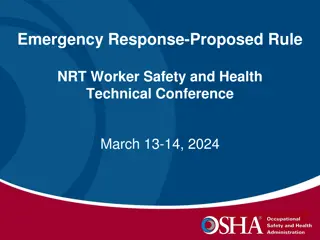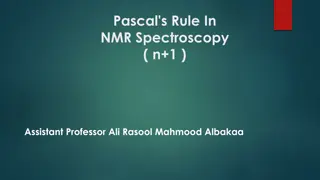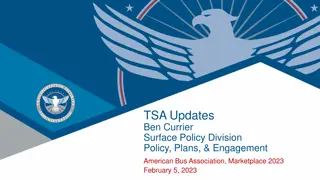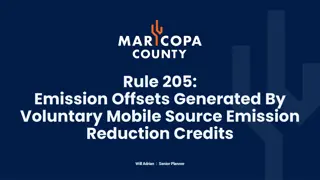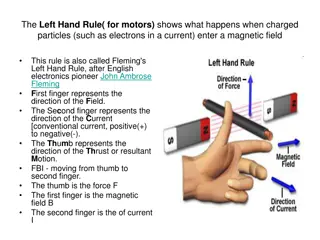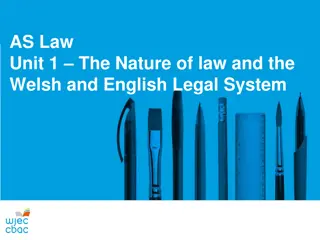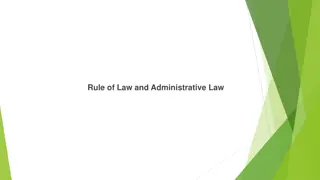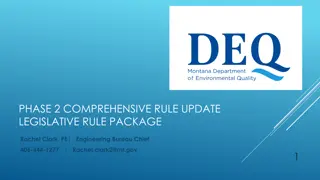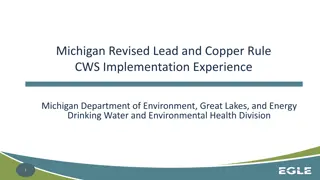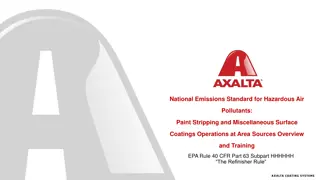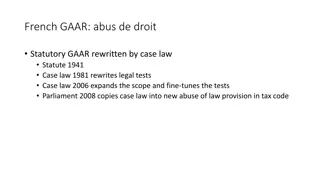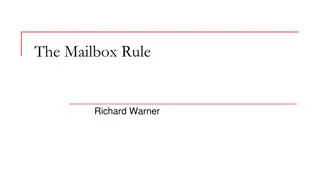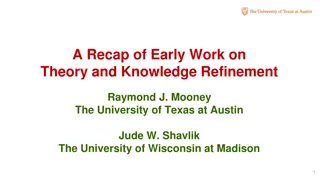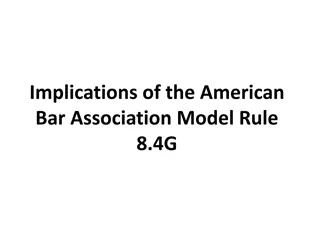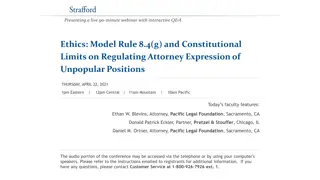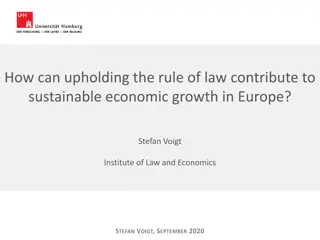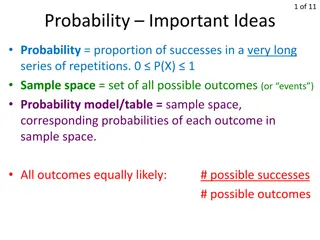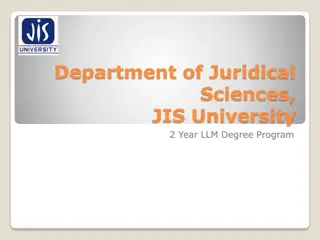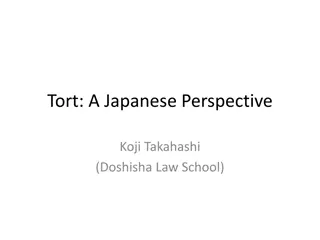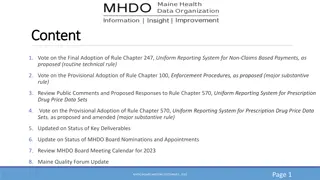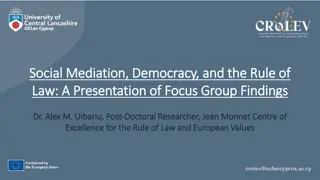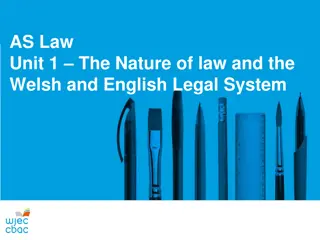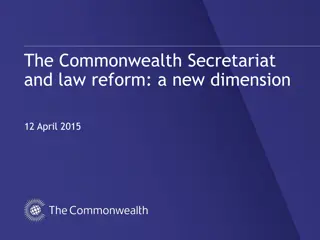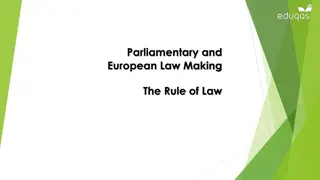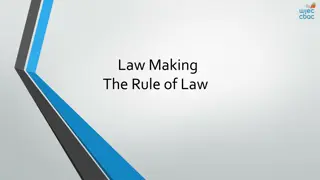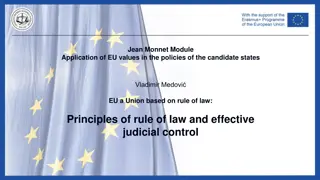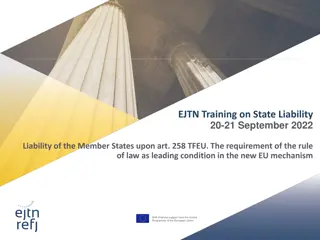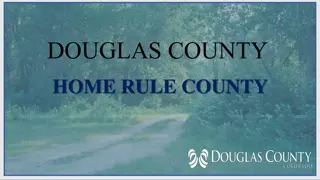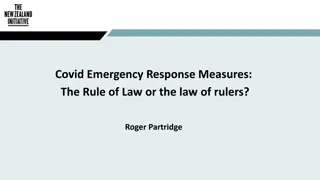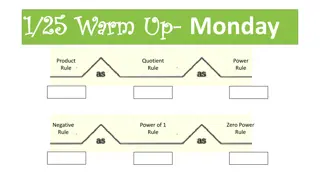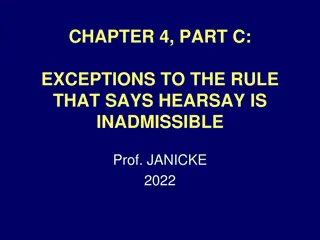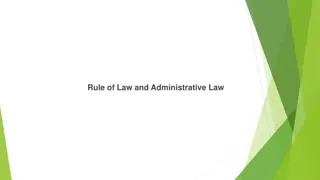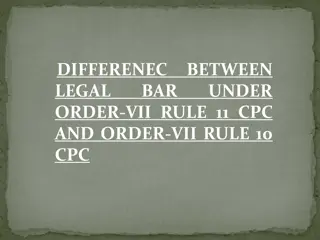Emergency Response Proposed Rule - Worker Safety and Health Conference
The Emergency Response Proposed Rule aims to update regulations for worker safety and health, expanding coverage to include technical search and rescue and emergency medical service entities. The rule proposes replacing the existing Fire Brigades standard with an Emergency Response standard. Federal
9 views • 23 slides
Pascal's Rule in NMR Spectroscopy ( n+1 )
Pascal's Rule in NMR spectroscopy, also known as the (N+1) rule, is an empirical rule used to predict the multiplicity and splitting pattern of peaks in 1H and 13C NMR spectra. It states that if a nucleus is coupled to N number of equivalent nuclei, the multiplicity of the peak is N+1. The rule help
12 views • 30 slides
TSA Updates on Security Training Rule for OTRB Companies
In the recent updates by TSA, the Security Training Rule for over-the-road bus (OTRB) companies has been highlighted. The rule mandates TSA-approved security training for employees in security-sensitive roles, emphasizing key requirements and elements of security training. Urban areas covered by the
15 views • 18 slides
Compliance Guide for Rule 205: Emission Offsets & Mobile Source Credits
Rule 205 outlines the process for generating emission offsets through voluntary mobile source emission reduction credits in Maricopa County. The rule-making process, state implementation plan submission, and permit conditions related to Rule 205 are discussed. The preparation for compliance includes
2 views • 7 slides
Fleming's Left Hand Rule and Electric Motors
Fleming's Left Hand Rule, also known as the Left Hand Rule for Motors, explains the interaction between charged particles and magnetic fields. Electric motors utilize this principle to convert electrical energy into mechanical energy through the interaction of magnetic fields and current-carrying co
6 views • 6 slides
Gas Laws: Boyle's, Charles', Gay-Lussac's, and Avogadro's Laws
Gas laws such as Boyle's Law, Charles' Law, Gay-Lussac's Law, and Avogadro's Law govern the behavior of gases under different conditions. Boyle's Law relates pressure and volume at constant temperature, Charles' Law relates volume and temperature at constant pressure, Gay-Lussac's Law relates pressu
1 views • 19 slides
The Rule of Law and Legal Systems in Wales and England
The content discusses the nature of law, the Welsh and English legal systems, and the Rule of Law doctrine. It includes observations from the 2019 AS Law Unit 1 examination, emphasizing the importance of adhering to rubrics and answering questions clearly. Candidates faced challenges with timing and
1 views • 14 slides
Evolution and Criticisms of the Rule of Law
The rule of law, originating from classical Greece and emphasized throughout history, ensures equality before the law and limits arbitrary power. A.V. Dicey's three principles summarize this concept, emphasizing accountability for all, including government officials. While criticized for its limitat
2 views • 9 slides
Phase 2 Comprehensive Rule Update Legislative Rule Package Overview
Seven subdivision bills were adopted during the 2023 session, covering various topics such as independent reviewers, cut and fill systems, connection to public sewer systems, and more. The public comment period and hearing are scheduled, with the draft rule to respond to comments by August 25. A bil
4 views • 17 slides
Contrasting Legal Systems Around the World
Explore the diverse legal families globally, such as Civil Law (Romano-Germanic) and Common Law (Anglo-American), along with their historical backgrounds, sources of law, and dominant ideologies. Delve into the distinctions between Civil Law and Common Law, their origins, development, and practical
4 views • 17 slides
Michigan Revised Lead and Copper Rule Implementation Experience
The Michigan Department of Environment, Great Lakes, and Energy shares insights on the implementation of the Michigan Revised Lead and Copper Rule. Key topics include rule revisions, data outcomes, challenges, and development drivers. The rule aims to reduce lead levels, update sampling protocols, a
3 views • 26 slides
EPA Rule 40 CFR Part 63 Subpart HHHHHH Overview
EPA Rule 40 CFR Part 63 Subpart HHHHHH, also known as The Refinisher Rule, sets standards for hazardous air pollutants in paint stripping and surface coatings operations. The rule aims to control emissions of target hazardous air pollutants in collision centers and surrounding areas. It outlines req
2 views • 20 slides
French General Anti-Abuse Rule (GAAR): Evolution and Application
The French General Anti-Abuse Rule (GAAR) has seen developments through statutory revisions and case law interpretations since 1941. This rule targets fictitious acts and acts aimed at reducing tax burdens through exploiting legal technicalities. The legitimacy of GAAR extends to tax treaties, with
2 views • 5 slides
Overview of UK Law: Statute Law, Common Law, Criminal Law, Civil Law
Statute Law is written law created through the parliamentary process, forming the basis of the legal system. Common Law, on the other hand, is unwritten law based on judicial decisions and precedents. They govern different aspects such as civil and criminal matters, each with its unique characterist
3 views • 15 slides
The Mailbox Rule in Contract Law
The Mailbox Rule, a common law principle, stipulates that acceptance of an offer is valid when dispatched, providing certainty in contract formation. This rule is illustrated through scenarios involving delays in mail delivery and parties' need for assurance in contractual agreements. The examples h
4 views • 14 slides
Evolution of Theory and Knowledge Refinement in Machine Learning
Early work in the 1990s focused on combining machine learning and knowledge engineering to refine theories and enhance learning from limited data. Techniques included using human-engineered knowledge in rule bases, symbolic theory refinement, and probabilistic methods. Various rule refinement method
3 views • 12 slides
Implications of ABA Model Rule 8.4(g) on Professional Conduct
The American Bar Association's Model Rule 8.4(g) addresses professional misconduct in legal practice related to discrimination and harassment based on various factors. The rule has been adopted by some states, sparking discussions on its implications and challenges within the legal community. Explor
1 views • 67 slides
Classification of Law: Understanding Different Types and Functions
Exploring the classification of law is essential for understanding the diverse nature of legal systems. This overview delves into domestic law vs. public international law, public law vs. private law, and the sub-divisions within public law, such as constitutional, administrative, and criminal law.
3 views • 19 slides
Overview of Legal Systems and Roman Law Development
Legal systems play a crucial role in governing societies, with Roman Law, Common Law, Civil Law, and Religious Law being some of the major types worldwide. Roman Law, focusing on private law, has influenced legal traditions in various regions, especially in Europe. Contrasting Common Law and Civil L
2 views • 26 slides
Ethics & Constitutional Limits on Attorney Expression Webinar
Join the live 90-minute webinar on Ethics: Model Rule 8.4(g) and Constitutional Limits on Regulating Attorney Expression of Unpopular Positions featuring expert faculty members. Explore regulations governing lawyer speech and the requirements for lawyer communication in various contexts. Learn about
5 views • 57 slides
Upholding the Rule of Law for Sustainable Economic Growth in Europe
Democracy and the rule of law are essential for sustained economic growth in Europe. The rule of law ensures stable and impartial enforcement of rules such as property rights and contract law, key for market economies. Upholding the rule of law is crucial for combating corruption and maintaining a f
2 views • 6 slides
Probability: Key Concepts and Rules
Probability is the proportion of successes in a long series of repetitions. Important ideas include the 0-1 Rule, the 100% Rule, the Complement Rule, the Addition Rule, and the Multiplication Rule. These rules govern the calculation of probabilities in various scenarios. Learn the fundamental princi
3 views • 16 slides
2-Year LLM Degree Program in Juridical Sciences at JIS University
Explore the 2-year LLM degree program offered by the Department of Juridical Sciences at JIS University, specializing in Corporate Law, Criminal Law, and Constitutional Law. The program covers a range of specializations such as Comparative Criminal Law, Human Rights, Corporate Law, Competition Law,
2 views • 7 slides
Japanese Tort Law: Choice of Law Rules and Double-Actionability
Japanese tort law follows specific choice of law rules, determining the applicable law based on factors such as the place of injury, product liability, and defamation. The double-actionability rule ensures that the harmful act is also unlawful under Japanese law and that remedies are available. This
2 views • 14 slides
MHDO Board Meeting Summary - Rule Adoption and Public Comments Review
The MHDO Board met on December 1, 2022, to vote on rule adoptions, including Rule Chapter 247 and Rule Chapter 100, and reviewed public comments on Rule Chapter 570. The meeting covered technical and substantive rules and responses to feedback from stakeholders.
0 views • 12 slides
Social Mediation, Democracy, and the Rule of Law: Focus Group Findings
Dr. Alex M. Uibariu presents findings on social mediation, democracy, and the rule of law from a focus group study. The research explores the interconnectedness between democratic values, governance, and civic engagement. Discover how civic engagement can contribute to upholding the rule of law thro
5 views • 11 slides
Overview of Legal System and Branches of Law
This content provides an overview of various aspects of the legal system, including the concept of legal systems, municipal law, international law, public vs. private law, and different branches of law such as public law, private law, and criminal law. It delves into the relationships between indivi
3 views • 20 slides
AS Law Unit 1: The Nature of Law and the Welsh and English Legal System
The content discusses the Rule of Law doctrine, including key concepts such as Dicey, separation of powers, CRA 2005, and breaches of the rule of law. It provides insights into candidate observations, responses, and recommendations based on the 2019 AS Law Unit 1 examination.
3 views • 14 slides
Commonwealth Secretariat and Law Reform Initiatives
Explore the Commonwealth Secretariat's focus on law reform, its mandates, the importance of the rule of law, and strategic plans for democracy, human rights, and sustainable development. Learn about the Rule of Law Division's new approach to addressing legal frameworks, emerging areas of law, and ch
1 views • 10 slides
Introduction to Macedonian Company Law by Associate Professor Kristina Misheva, PhD in Law
Associate Professor Kristina Misheva, PhD in Law, from the Faculty of Law at Goce Delcev University, will be delivering a lecture on the development of Macedonian company law within different legal systems, including discussions on unifications of the law in the context of various political systems.
0 views • 4 slides
Understanding Britain's Unwritten Constitution and Rule of Law
Explore the concept of Britain's unwritten constitution, separation of powers, supremacy of Parliament, and the rule of law. Learn about breaches of the rule of law and the debate over a written constitution. Discover the principles shaping the British constitution.
6 views • 13 slides
Understanding Britain's Unwritten Constitution: Rule of Law, Separation of Powers, and Parliamentary Supremacy
Explore the unique nature of Britain's unwritten constitution, covering key concepts such as separation of powers, parliamentary sovereignty, and the rule of law. Discover the sources of the constitution, breaches of the rule of law, and debates over a written constitution.
2 views • 13 slides
Principles of Rule of Law in the EU: Application and Manifestations
Explore the significance of the rule of law in the European Union, focusing on its principles, application, and manifestations. Understand how the EU values democracy, fundamental rights, and judicial control. Learn about equality of EU citizens, effective judicial protection, and the role of indepe
2 views • 7 slides
Understanding the Rule of Law in the European Union
Explore the concept of the rule of law in the EU, focusing on the limitations of governmental powers, the role of an independent judiciary, and the necessary legal procedures. Learn about the significance of the rule of law in ensuring individual rights and governmental accountability within the EU
6 views • 54 slides
Home Rule County in Colorado: Advantages, Disadvantages, and Process
Learn about Home Rule Counties in Colorado, including the advantages (distinguishing from state government, local law creation), disadvantages (election requirements, misunderstanding), and the nine-step process to establish Home Rule status. Explore the detailed schedule and timeline for transition
4 views • 18 slides
Covid Emergency Response Measures: The Rule of Law vs. the Law of Rulers
Explore the debate over Covid emergency response measures and the balance between the rule of law and the authority of rulers. Learn about the importance of legal authority, accessibility of the law, and the impact of extraordinary lockdown powers on individuals and society.
2 views • 13 slides
Exponent Rules Review and Practice for Math Class
Enhance your understanding of exponent rules with this detailed content covering product rule, quotient rule, power rule, zero power rule, negative rule, and more. Get ready to simplify expressions and raise powers efficiently. Stay ahead in your math class with these valuable resources!
0 views • 35 slides
Exceptions to Hearsay Rule Analysis
Explore exceptions to the rule that states hearsay is inadmissible, including unrestricted exceptions and specific scenarios such as present sense impression and excited utterance. Learn about Rule 802, Rule 803, and Rule 804, which govern the admissibility of hearsay evidence in legal proceedings.
0 views • 37 slides
Understanding the Rule of Law and Administrative Law
Learn about the historical origins and principles of the rule of law, including Dicey's exposition and criticisms. Explore why the rule of law is crucial for democratic governance and the protection of individual rights and liberties.
2 views • 9 slides
Difference Between Legal Bar Order VII Rule 11 CPC vs Order VII Rule 10 CPC
This presentation delves into the distinctions between legal bars under Order VII Rule 11 CPC (specifically clause (d)) and Order VII Rule 10 CPC. It touches upon the rejection of plaint under Order VII Rule 11 CPC, discussing competency of suits, causes of action, valuation of relief claimed, and m
1 views • 26 slides
